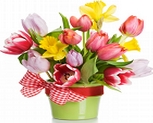BFHA Spring Gardening Tips
May Gardening Tips

Chores and Maintenance
- Finish preparation of planting beds
- Continue to cultivate planting beds and carefully remove young weeds
- Dig and divide early-blooming perennials after flowering
- Lift, divide, and replant late summer and fall-blooming perennials
- Set supports for floppy plants, vines, and vegetables
- Mow lawns regularly to keep grass at 2 1/2″ height
- Begin watering program as necessary
- Begin weeding
- Aerate and moisten compost pile to speed decomposition
- Mulch azaleas and rhododendrons, and other ericaceous ornamentals with acid mulch
- Mulch planting beds
- Deadhead bulbs but allow foliage to remain until yellow to nourish bulbs for next year’s display
- As night temperatures moderate into the 60’s, move houseplants outdoors (avoid full sun and windy locations)
- Look for pests and other problems; spotting early can mean less chemical controls. Note: slugs and caterpillars can be removed manually
- Begin application of deer repellents
Planting
- Move self-sown annuals and perennials to desired locations
- Sow seeds of corn, cucumber, and melon directly in the garden
- Harden off tomato, eggplant, and pepper transplants before planting out at end of month
- Complete planting deciduous trees and shrubs, weather and soil conditions permitting
- Continue to plant and transplant perennials
- Plant summer annuals after last frost date
- Plant summer-flowering bulbs such as gladiolas and dahlias after last frost date
- Plant caladium and tuberous begonias in shady spots
- Complete re-seeding bare lawn areas
Pruning/Fertilizing
- Pinch back late summer and fall-blooming perennials
- Continue to prune all plant material to remove any diseased, dead, weak, or crossing branches
- Prune early spring-flowering shrubs after blooming
- Wait to prune evergreens, hedges, and other shrubs until late spring into early summer
- Begin deadheading roses
- Fertilize roses
- Fertilize needle evergreens with acid type fertilizer
- Fertilize bulbs as they finish blooming
- Fertilize annuals and container plants
- Fertilize lawns in late May (leaving grass clippings on the lawn can reduce the need to fertilize)
Indoors
- Take out houseplants as temperatures moderate; move to partially shaded, wind-protected location



{ 0 comments… add one }